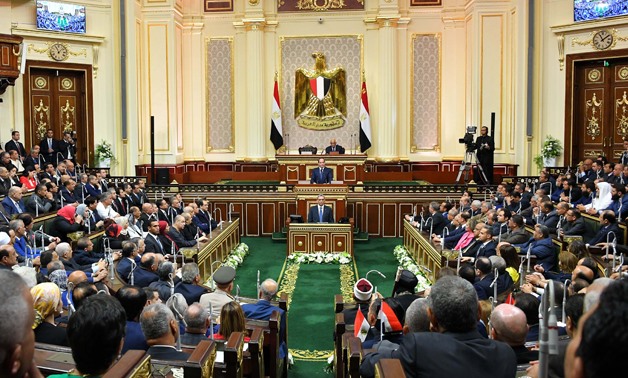
President Sisi gives a speech at the House of Representatives downtown Cairo on Saturday, June 2, 2018, after he swore in for a second term in presidency - Press photo
CAIRO – 3 October 2018: President Abdel Fatah al-Sisi objected to some articles of the draft law regulating medical and clinical research, calling the Parliament to reconsider them, House of Representatives’ Speaker Ali Abdel Aal announced on Tuesday during the fourth round’s plenary session.
President Sisi referred in his letter to the Parliament that the draft law is important and dangerous, as it is related to the protection of the constitution, the sanctity of the human body, and the freedom of scientific research.
In this regard, he referred to Article 60 of the Egyptian Constitution reading “the sanctity of the human body is inviolable and assaulting or defaming it is a crime that shall be punished by law. Human body shall not be subjected to any medical and scientific experiment.”
The Egyptian president returned the draft law to the Parliament to be reconsidered, opposing the draft law’s Articles 4, 5, 9, 11, 19, 20 and 22, which refer that all researchers and scientists should seek the prior approval of the Higher Council of Medical Research ahead of conducting any medical or clinical experiments and tests.
“The researches include masters, doctorate, free and funded researches in the Faculty of Medicine. That means it is impossible to follow up these huge numbers of researches, carried out every month, only by committees in every research entity.”
Sisi also opposed the small number of representatives of Egyptian faculties and institutes in the Supreme Council, which reaches only 4 out of 15 members as 97 percent of researches are carried out inside faculties and institutes.
Sisi further rejected the draft law’s punitive articles as “they do not take into account the nature of scientific research and consider that the irregularities are the same in all types of research.”
Moreover, the draft law stipulates that sending human samples abroad shall be punished by a prison sentence.
In this regard, President Sisi said that sending the samples abroad will allow examining them with modern equipment, which may not be locally available; hence, the draft law will require issuing reports on specialists’ work free of charge, costing the state a lot of money and affecting the quality and expansion of scientific research in Egypt.
On May 13, Egypt’s Parliament provisionally approved a 35-article law aimed at regulating the business of medical and clinical research in Egypt.
After Parliament's Health Committee initially approved on April 25 the first draft law, known as the Clinical Trial Law, which governs the organization of clinical and medical research in Egypt, many concerns have been raised over the ethical nature and legality of the process.
Clinical trials are the tests that are conducted on human participants, or groups of humans, in order to evaluate the effectiveness and safety of newly developed medications or medical devices.
As the second-biggest destination country for clinical trials in Africa, Egypt has witnessed a steady increase in the number of trials it hosts, which has pushed Parliament to discuss this law, potentially putting strict controls on experiments that are conducted in hospitals.
In February 2016, there were 57 active clinical drug trials, and over half of these trials were to assess cancer treatments.
Researchers’ concerns: Egyptians aren’t test mice
Researchers have raised concerns over the new draft law, asserting that specific standards should be stated to prohibit foreign companies from testing newly discovered drugs on Egyptian patients without testing them firstly in the company’s originating country; there should be strict rules for any local or foreign company that tests its drugs in Egypt.
Ehab el-Taher, secretary-general of the Doctors' Syndicate, stated to state-run Al-Ahram news website that the syndicate is keen to have a clinical testing law in Egypt so that citizens are not exposed to a field experimentation by foreign companies. He asserted that Egyptian regulations allow a foreign drug trial to be conducted only if the product being tested has been granted market approval in the originating country.
“In addition, we have to analyze the components of new drugs before experimenting them on humans, and make sure that they are free of toxicity,” he added.
Taher also affirmed that these tests should not be conducted except in governmental hospitals and research centers. The private sector is not allowed to carry out such experiments on its own.
The Doctors' Syndicate has implicitly approved the bill in general, but wants the defects solved.
Additional Report by Jehad El-Sayed


Comments
Leave a Comment